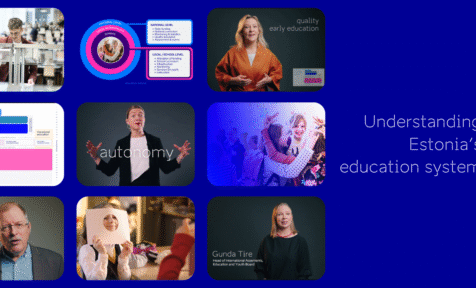I am not sure if it has occurred to anyone, but Estonians are not, in fact, born with a unique digital gene. You know, the one that would somehow justify the development of our very advanced digital society. A digital nation, if you will, where 99% of the public services are online. And where people obtain and use government-issued electronic IDs, sign contracts digitally, and i-vote as a norm.
The full article by Erika Piirmets, digital transformation adviser at the e-Estonia briefing centre, can be read on the E-Estonia webpage.
Innovation and digitalisation are only partly technological and primarily human, meaning it is less of an art of coding and more a vision-based leadership and change management.
Digitalisation involves a change in habits, just like any transformation, and this process requires leadership and guidance to give people the tools and motivation to make the change happen.
From weird to doable
People’s mindset shift from the proposed change to forming new behaviour requires getting across three simple understandings – that a) this weird change could turn out to be a very normal process, it will b) deliver benefits and be rewarding for me, and c) it’s not so complicated and I, too, can do it!
Read also: Digital Competence
– Empowering teachers and students
This is where all the public and private stakeholders come in to help make the shift happen. When Estonia started the digitalisation route, it also claimed responsibility to launch technological solutions and digital services and help people obtain essential ICT skills and raise awareness on the topic.
Learning happens in public squares and private companies
Raising awareness and teaching people to use digital tools was and continues to be a common goal. Private companies joined the initiative to train their employees in primary computer and information literacy skills, and universities included ICT in all their professional studies; similarly, as a foreign language requirement, knowledge in ICT became unavoidable to graduate.
The Tiger Leap program: modernizing education in Estonia
Also, the Tiger Leap program was launched by the government in 1996 to modernise the education system by providing all schools with computers and internet connections and delivering basic teacher training and native-language electronic courseware.
Different public institutions endlessly introduced new digital services and how to use them by providing courses or simply setting up tents on city squares and parks to answer all the doubts and questions people might have.
Continuous efforts to enhance digital literacy
Many of the courses and assisting activities continue to this day. In 2018, the Ministry of Economic Affairs and Communication launched a training project carried out by the Estonian National Library and BCS Koolitus firm with a budget of over half a million Euros to enhance digital literacy for 6000 participants.
According to the most recent statistics, approximately 2000 librarians across Estonia daily consult and train their patrons. Libraries are one of the key stakeholders in bringing these digital literacy skills to regular people through these training projects funded by the state.
Lifelong learning of digital skills
The role of librarians has been tremendous in providing practical, daily assistance in public libraries across the country to help people get accustomed to using e-services. From my personal experience as a former library consultant, I can assure you – these programs are helpful and reach the intended population. I had patrons needing full 1:1 attention the first year; they started to declare the taxes online, the second year, returned to me for assistance just in case they made a mistake, then in the third year not book an appointment anymore because they had learned the process and could manage on their own. Getting accustomed to and gaining the skills might be a lengthy road, but it is gratifying.
Technological changes happen faster than the public sector can keep up, which is why constant training is required. For libraries to become an extensive support network for the information society, the state needs to continue the actions so far – provide budget and collaboration so librarians in every corner of Estonia can provide quality and up-to-date courses on digital literacy.
Digital State Academy
However, not only librarians but civil servants in all state authorities need upkeep in digital skills and cyber hygiene. That’s why the Ministry of Economic Affairs and Communications partnered up with Tallinn Technical University (TalTech) and launched Digital State Academy – virtual free courses available (highly suggested, even) to civil servants on various critical topics concerning digital state and e-governance. The courses include Digital State, Data, AI, Design of e-Services, and Integrity of e-Services. Digital State Academy was the first training course I signed for after I started working as a Digital Transformation Adviser.



